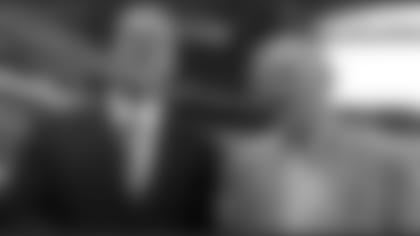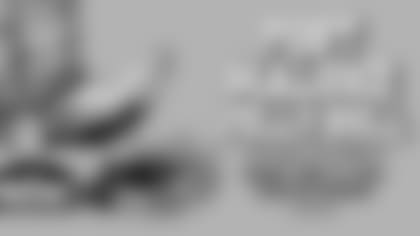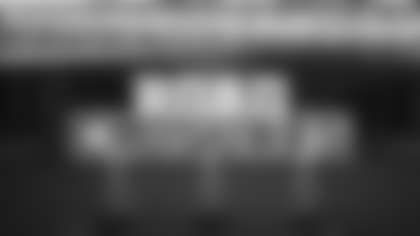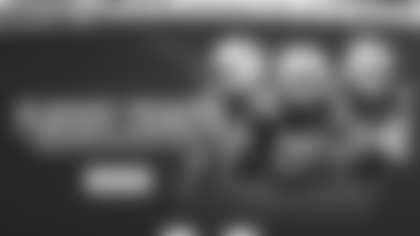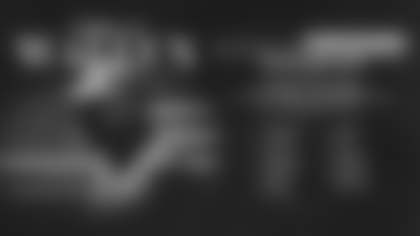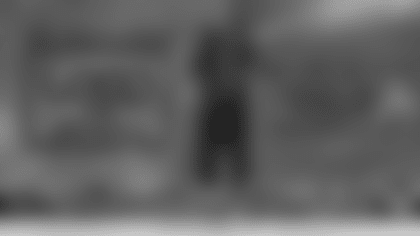**
**
*Question: A 31-9 victory over the Tennessee Titans on Sunday, and now the Colts are 5-0. But the Colts also have been through a lot in terms of injuries. 'Next Man Up' really meant something in the first five games of the season, didn't it?
Answer:* Yes, it did. That we went into (Sunday) night's ball game minus three of our starting four defensive backs and still performed as well as we did is pretty amazing. But it's a credit to the players and to the coaches for adopting the 'Next Man Up' theory, and to people like (safety) Melvin Bullitt for stepping in and playing at a very, very high level. It's to their credit, and we've had a great first five games. Now, we'll get a chance to kick back, take a deep breath and relax and get some rest, then get ready for the second half of the season.
Q: There are two weeks remaining until the next game, but is this a chance to get some of the injured players back?
A: We'll see. I think the arrow is up on (safety) Bob (Sanders). I don't want to put a timeframe on that, but he has been out taking some activity with the scout team. We'll see if we can ramp that up this coming week and perhaps into St. Louis week. (Cornerback) Marlin (Jackson), I think, is a little bit away still. (Cornerback) Kelvin (Hayden) probably is the closest. We'll see where we are there. We came through the game with little or no serious injuries for the first time in five weeks. That part of it was really positive. For St. Louis, we should have all hands on deck other than the defensive backs, and that will be a catch-as-catch-can kind of situation. That's good and the way you'd like it to be entering a bye week. So, we feel pretty good about that and we'll just take it from here.
Q: Did the Tennessee game play out as you expected?
A: No, actually. I was quite surprised, No. 1, by the way they elected to play us defensively. They basically said, 'We're going to rush with our front four. We think we can overpower you there. And we're going to play coverage with our back seven, and we're going to do it with our linebackers rather than with our nickelback because of our injury situation. We're going to play our safeties deep and not give you any big plays, and we're going to make you go the long way,' and take advantage of the fact that maybe we wouldn't be patient or maybe we wouldn't be able to get the job done in that kind of a situation. They were banking on their front four controlling our front five, and while their front four is great and acquitted themselves – actually it's eight people; they rotate guys in and they're all pretty darned good, by the way – essentially we won that battle by a slim margin. Not overwhelmingly, but by a slim margin and that allowed us, therefore, to do other things that were good, particularly in the passing game, and that allowed us to score points. I was a little surprised they would take that position, but when you look back on it, given their injury situation, and given the fact that they have so much confidence – as they should – in their front four, and given the fact that our offensive line had not played terribly well, it was probably pretty sound strategy. It turned out that because of the turnovers and because our offensive line acquitted ourselves well, in the end we were able to win the football game.
Q: The defense had two really big possessions on which the unit held the Titans to field goals following turnovers in Colts territory . . .
A: That's kind of unheard of around here. We've been doing things on defense this year that we haven't done in quite some time. One thing is covering in both three-deep zone, where essentially the corners are man- to-man if the route gets deep, and in man-to-man coverage. The play (rookie cornerback) Jacob Lacey made in the end zone is not one we've seen made around here on a routine basis. (Rookie cornerback) Jerraud Powers is doing a terrific job. (Cornerback) Tim Jennings is doing a terrific job, so we've gotten better coverage and our safety play always has been really good. But we've gotten better coverage. That made a difference, albeit it turned out to be our strength versus what was not a strength for them, their receiving corps. We won that battle. I don't think they expected that to happen, and I'm not sure we expected it to happen, to be truthful with you, especially with two rookies. They did a good job blocking our front, but we won some key battles up there that caused some errant throws. We didn't unfortunately take advantage of them as well as we should have, but still, I think we did a pretty good job in that area. Then for the defense to get in essence two turnovers and hold them to field goals in the plus territory, that's really something. That's a tremendous performance and to be able to shut down their run: they got 20 yards at the end, so essentially we held them to 70 or 75 yards rushing prior to that point in time. That's the No. 1 rushing team in the National Football League, so that's a great tribute to our defensive players and defensive coaches. They did a great job getting ready, and they executed.
Q: And once the offense got rolling, it really got rolling. And what a play right before halftime by rookie wide receiver Austin Collie . . .
A: It was a great run after the catch. That's another thing that is sort of new for us this year. We're getting run after the catch and we're getting big-time blocking by the wide receivers. That's only going to be to the good as time goes by. In the running game, we'll get more big plays. Their run after the catch really has been terrific, and that one was spectacular. That was a great catch and run. It was a one-minute drive, which is really something, and it essentially changed the whole complexion of the game.
Q: The coverage units are also playing well, which you haven't seen in a while . . .
A: No, we haven't, especially not on kickoff coverage. That's where we're so much improved, is on kickoff coverage. We're able to limit them. First of all, the kickoffs are magnificent and we're able to limit the opposition so that even when you get a run that breaks out, it's not going much past the 35 or 40. It's not going down to our 10 or our five or for a touchdown. In most cases, we're keeping the ball in there inside the 25, which is making the opposition go a long way, which is really a good thing. That has been a marked improvement. Coverage has been a marked improvement, and run after the catch has been a marked improvement. Those are three things we have not had in great abundance in quite some time.
Q: How do you improve? When you're playing so well, can you get players' attention?
A: There are lots of things we can improve. (Defensive line coach) John Teerlinck is fond of saying, 'Don't miss the layup.' When you get a layup interception, you have to take advantage of it. In two of those cases, the defensive rush created the interception and we should have had it. That clearly can be improved. In terms of blocking efficiency and run efficiency, we can improve that pretty dramatically. That has not been what it should be, or can be, or will be. Some areas of pass protection can be improved, particularly one-on-one. (Tennessee) defensive end Kyle (Vanden Bosch) gave us a hard time. Not quite as hard as perhaps it appeared to the naked eye, but he was nevertheless a force for the period of time he was in there. At his age, he needs rest, but when he's in there and jacks it up, he's pretty hard to handle. He did a great job. We can improve that certainly. There are areas on defense we can improve, particularly in terms of all-out hustle all the time. We had some people like (defensive end) Keyunta Dawson that really stepped up and did a great job of that, but there are other people who can improve upon what they're doing. It's good enough, but it can improve. The message for our team this week is nobody stands still in the National Football League. You either get better or you get worse. Even though we're in a position where we want to get healed up and we want to rest injuries and we want to give people normal rest, we need to do our work and make sure we do it in such a way that improves us. I will say this, (Colts Head Coach) Jim Caldwell has done a heck of a job preparing our team and getting them rested through this very difficult stretch. (Sports Illustrated NFL writer) Peter King in his column (Monday) said he can't remember anyone ever having three prime-time road games in his covering the National Football League where you get back at 3, 4, 5 o'clock in the morning three out of five weeks. We've overcome that. We've fought through it. Jim has done a wonderful job making sure our team is focused and able to handle that. We now go into a little bit of a different phase, playing at home, playing in our own time zone. We have to concentrate on getting better now – not overcoming the obstacles of travel – so that's our charge as we go forward. Nobody stands still. You either get better or you get worse. It's out job to get better.
Q: The players have been accustomed to playing at night and now they have to start playing a 1 o'clock and noon. That's a huge difference . . .
A: We build our practice schedule around that starting way back in training camp. We take that into consideration, so we should be OK with it. We just have to make sure we're focused, and as we go through that practice week that we focus on the fact that we're going to play an early game.
Q: Can you talk about the impact of the kickoffs of rookie P-Pat McAfee?
A: McAfee's kickoffs have obviously played a major role. He kicks the ball very high and he kicks it very deep. He is capable of kicking touchbacks, which really help, both in terms of field position and saving wear and tear on your coverage unit. With our offense, we do kickoff a lot. That always has been a difficulty for us and it will get a little bit more difficult as the season goes on, because Pat's not used to kicking off as much as he has been kicking off. That's an issue we have to deal with as the season goes on. There are benefits to having a great offense. That's one of the drawbacks to it. Or the other side of the coin, you might say.
Q: Can you talk about the play and progress of LT-Tony Ugoh?
A: It's a very interesting question, because it puts it really in three contexts. The first context is, 'Is Tony Ugoh a solid National Football League player?' The second is, 'If he is or isn't, how come Charlie Johnson has the job?' The third context is, 'Well, what did you pay for him?' Let me address the third context first. It doesn't matter what you paid for a player so long as the player performs. For every Tony Ugoh that may not end up being a bona fide, first-time-out-of-the-box starter, there's a Jacob Lacey or a Jerraud Powers, so it all balances out. It's not about what you paid for a player. I've often told the scouts and I've said to everyone in the building, 'We're not out to win the draft. We're out to win football games. It's about the 53 players you put on the field. If you stop and think about it, I think that's one of the reasons we've had so much success in the draft, because we're not out to win the draft. We get 'C's every year and we're proud of it and happy to get them. We want to get 'A's when it comes to performing on the field. So, it doesn't matter where we took him or what we paid for him. The only question is, 'How good a player is Tony Ugoh?' Now, last night, interestingly when you watch the tape, you find out that he really did a very credible job. He went out by the way with an ankle injury late in the third quarter or early fourth quarter. It was a fairly serious injury. Fortunately, it's not a high-ankle sprain, so I think he'll be OK. He did a very credible job. There were two occasions when Vanden Bosch overpowered him, which is going to happen to the best of them. Vanden Bosch is a very, very good player. I can't recall whether the interception came over his man or (right tackle) Ryan Diem's. One of the tackles got run by and it caused the interception. Those plays tend to stand out, just like plays that defensive backs don't make. Passes that are completed tend to stand out, but over the course of a 60-play game, Tony Ugoh played pretty darned well. If you said to me, 'Is Tony Ugoh a good player?' I'd probably say, 'Yes.' Is he as good a player as maybe some people who have higher profiles in the media? The answer is probably yes. The bottom line is, we talked last week about standard of performance. His consistency level – although it was there Sunday night, I must say – has not been what Charlie's has been. Since we go to standard of performance, Charlie won the job. But to Tony's credit, when he had to step in and play Sunday night, he played pretty darned well. And as one of our Pro Scouts, Kevin Rogers, said many weeks ago as we were discussing the formation of our roster, 'There are a lot worse players than Tony Ugoh starting for other teams in this league. That's for sure.' Don't get down on him. We're not. It's a work in progress. If I can point to one thing Tony doesn't have, it's great lower body strength and therefore, he needs to be able to be pretty much technically perfect on every play. If he's not technically correct, then against a Vanden Bosch he's going to have a little difficulty from time to time. But he hung in last night and did a very, very credible job. There's no reason to worry about Tony Ugoh, and there's no reason to point fingers at Tony Ugoh, and we're very happy we have Tony Ugoh.
Q: There are a lot of good questions to have once some of these guys get healthy – where does WR- Anthony Gonzalez play when he returns? And what role does S-Bob Sanders play?
A: We'll cross that bridge when we come to it. In my experience, there will be some roadblocks before we get to that bridge.
Q: How do you approach the bye week? Do you practice injured players or let them heal?
A: It depends upon the player's individual situation. If a player would normally be held out of practice because of an injury, the bye week won't make any difference along those lines. If they're going to be out we'll hold them out. Gonzo probably won't practice. Bob (Sanders) probably will continue on the regimen he has been on. Kelvin is probably ready to do go and Marlin is not. That will be that. Whether or not Peyton will take a lot of reps remains to be seen, probably not. We'll give probably give (Curtis Painter) most of the reps I would think, because he doesn't get a lot during the regular week and this is a good time for him to get some throwing in and a good time for Peyton to go to the bullpen and relax.
Q: Can you get that done?
A: (Laughing) That's a subject of negotiation. We'll try. Jim does a magnificent job of this, but we'll probably limit the amount of individual work we do in practice so you save the legs of the receivers and the defensive backs. Then, on the other side of the coin, we'll probably spend a lot of time working on individual technique with the offensive and defensive linemen. This is a good chance for them without game preparation to worry about to get back to individual technique work. Some of that can slide during the course of a season because you're so focused on preparation, and you're so focused week to week on putting a healthy team on the field. The aim changes and the objectives change in terms of practice, but by and large, if a guy would not be healthy enough to practice under normal circumstances if there were a game we certainly won't practice him this week.
Q: What are the chances you start seeing more of a rotation at running back the way the Colts rotated Joseph Addai and Dominic Rhodes in 2006?
A: It's interesting you bring that up. People remember Joseph and Dominic splitting the carries over the last fifth of the season, the playoffs and the Super Bowl run. They did not do that during the rest of the season. Joseph was getting the same amount of work that Donald (Brown) is getting right now – in fact, probably a little bit less. With a rookie, particularly a rookie running back, you want to be careful to husband his carries so you don't wear him out. They're not used to playing 16 games. Hopefully, we'll go more than 16, so you have to get them ready for that point in time and you have to be careful not to wear them out. So, I think the ratio we have right now is a good ratio. We have (reserve running back) Chad Simpson up and active if we needed him, and we will as time goes by. The mix is pretty good right now.
Q: Shouldn't the Colts have pulled Manning out of the game late with a large lead?
A: I think Jim wanted to make sure we finished it off without any bumps in the road, without any hiccups, and we did. We used up a good bit of time at the end. I think that was a pretty good decision. They're an explosive ballclub. Even when (backup quarterback) Vince Young was in there, you didn't know what was going to happen because he's unorthodox, to say the least. The game wasn't out of the woods. Nobody's going to earn a letter, so Jim is concerned only about the 'W's, not whether or not we rest people or give other people a chance to play.
Q: Can you explain the illegal wedge call on the kickoff return? And why it wasn't called on Tennessee in the second half?
A: Here's the rule: whether or not you have a wedge is judged principally on the time that it forms. The general rule of thumb is double-arms distance apart. If they're more than that, it's OK. If they're less than that, it's in violation. We were right on the borderline and they moved together in the same direction, which made it look more suspicious than it was. Then, the running back headed in that same direction. The wing official made the call. The referee in the end zone might have had a better look at it, but the wing official made the call. Based on his point of view, you couldn't argue it. It was a bit borderline, but they're told to look for it for good reason, because it's a safety issue. Our end man should have been further apart than he was. In the end, it is not what occurs at the point of attack that they necessarily focus on. It's what happens when the wedge is formed. In this case, we were over the line. Not by much, but nevertheless over the line. It's a very, very dangerous play. The league and the Competition Committee made a concerted effort to bring the kickoff return back into the game about seven or eight years ago by using K-balls and moving the kickers back because the return is such an exciting play. Well, for every action there's an equal and opposite reaction. What occurred was many, many more injuries, because these collisions take place at very high speed. They're like train wrecks and it's a dangerous, dangerous play. We're trying as a Competition Committee to strike a balance between keeping a very exciting play in the game and not putting players at risk. The elimination of the four-man wedge was a means of doing that. We're hopeful – and I think this is happening – that you get smaller players on the field. Smaller means less hurtful collisions or less powerful collisions and that you get much more athleticism involved than just pure bulldozing, which is what was occurring with the four-man wedge made up of four 300-plus pound people. Then, someone had to attack that and break it. That's where serious, serious injuries were occurring. By and large, I think the rule is having the desired effect. We won't know until the end of the year, but that's the genesis of it.
Q: Regarding Bob Sanders, what sort of condition is he in – bearing in mind that there's a difference in rehab shape and game shape?
A: It's a good question and a good point. Game shape is different than rehab shape. I would say right now he's in tip-top rehab shape. Everything has gone along very well there. Barring some unforeseen mishap, he's where he needs to be from a rehab standpoint. But he now must get to where he needs to be in terms of game condition and football condition and playing condition. That's what we're going to be working toward in the next little while. When he gets in that situation, he will be physically dealing with the subtle changes we've made in the defense, which he has dealt with very diligently from a mental standpoint from Day One. He has been at every practice, every meeting. He's into it. He's involved with the coaches and the other players at his position. He is clued in from a mental standpoint, but now he's going to have to get himself in a position where he feels comfortable doing the things we're going to ask him to do. That's the test over the next little while.
Q: How hard is it for a player to deal with being out and rehabilitating?
A: Very hard. There are lots of emotional ups and downs that you go through when you're injured. The first is that you don't feel as if you're contributing to the team. That can lead to a little bit of anxiety and some depression sometimes. Second, over time you worry about the length of your career. That's always a problem. Finally, you go through the ups and downs in Bob's case of rehabilitation for a third time in four years. That's really difficult. Anybody who has undergone orthopedic surgery in the last year or two will know that the rehabilitation part of it is the most difficult and the most time-consuming and the most frustrating. Bob has been through that a lot. In his case, it's hard and in any player's case, it's hard. Look at Marlin, for example. Marlin went through nine months of rehab – diligent, working day in and day out, and in many cases it's two steps forward and one step back. That one step back is really heartbreaking. It's tough to deal with and then you have to gear it up and do it again. He did a phenomenal job of it and lo and behold, boom, another setback. Fortunately, I don't think it's as difficult or as serious as the last one, so he'll be back. But it's really, really frustrating, and you feel for players. Fortunately, in this market particularly and generally around the National Football League people have become much more cognizant of the difficulty players face in rehabbing from injury and much more tolerant of the fact they're going to have to do this. I remember a time when people were really intolerant: 'Why isn't he out there? Come on, get him out there. He's not doing everything he needs to do.' Fortunately, this information age has made it pretty clear that virtually every player does virtually everything he can do all the time to get himself ready to play. But in the end, there's a lady named Mother Nature who determines a lot of this. We can't control her. When they're ready, basically they're ready. But it's a hard go. I, for one, really, really have great empathy and really feel for players who are going through it. I have great respect for the guys who do it and come back – Marlin Jackson and Bob Sanders being two of the most prominent examples.
Q: Can you comment on officiating a bit? When there's an error, how do you file a complaint? And were there any major rules changes this season?
A: There are official channels you must go through. I'll facetiously say that most of the time they fall on deaf ears. There were no significant rules changes this year other than the outlawing of the wedge on the kickoff return that would necessarily affect how you watch the game. Here's what every football person wants: They want a consistent game from week-to-week, regardless of which crew is on the game. Frankly, that's something the league office wants, too. It may be that that's too high a standard and you'll never reach it, but everybody wants to, and the league office tries to get there. You saw last week in the Baltimore-New England game a reference to the crew who did that game as the crew that calls the most penalties in the league. That has been historically true over the past two years. The point is you know what you're getting when you get that crew. We have had all-too often a crew that calls the fewest penalties in the league over the last three years. With them, you never know what you're getting because you never know when they're going to call a foul and when they're not going to call a foul. That's very, very disturbing and frustrating. That's the overall lay of the land. Through five games, I'm seeing a lot more consistency in some areas of officiating. I'm not necessarily sure I like it, but it's consistent. There is a lot more liberality in defensive pass interference. I'm not a big fan of that, but as long as they call it that way every week and we know what's acceptable and what's not acceptable, then I guess I'm OK with it. I'm seeing a point of emphasis on defensive holding that is being emphasized. That's probably all to the good. As has been widely mentioned, there is a point of emphasis on protecting the quarterback and not having the kinds of plays that injured (New England Patriots quarterback Tom) Brady last year. I think that that has been generally pretty consistently officiated. The league office has to step in there, too, and issue fines when there are egregious acts, and that has happened, too. The short answer is we're all striving for consistency. Is it there yet? No, but I would say on balance through the first five games it has been better than it has been, and that's a step in the right direction.
Q: The bye is coming up this week. How do you approach that as a team?
A: Historically, the bye week in the playoffs used to be almost a guarantee of victory. That isn't the case anymore, and I don't know why that is. It may be that injuries are up, or competition in free agency has just made it much more difficult to advance in the playoffs. But the bye used to be a guarantee, but it's not any longer. How you handle your preparation is probably an issue worth discussing. During the regular season in my experience I don't find it to be an issue. You rest the players during the bye week. You bring them back and go into a regular game week. You don't really miss much. In the postseason, it's a whole different kettle of fish, because a lot of it depends upon how healthy your team is. If you recall, it may not have been last year but the year before, we had a meaningless game at the end of the regular season and we didn't play the people who were legitimately hurt. A lot was made of it in the media. If we had wanted to play those players, we couldn't have anyway. They were all hurt, I think we had 12 players hurt or nine players – something along those lines. The end of the season is very different than the bye week during the season, and my experience is that we have been OK during the season. Obviously, the end of the season is something you revisit considering history.



